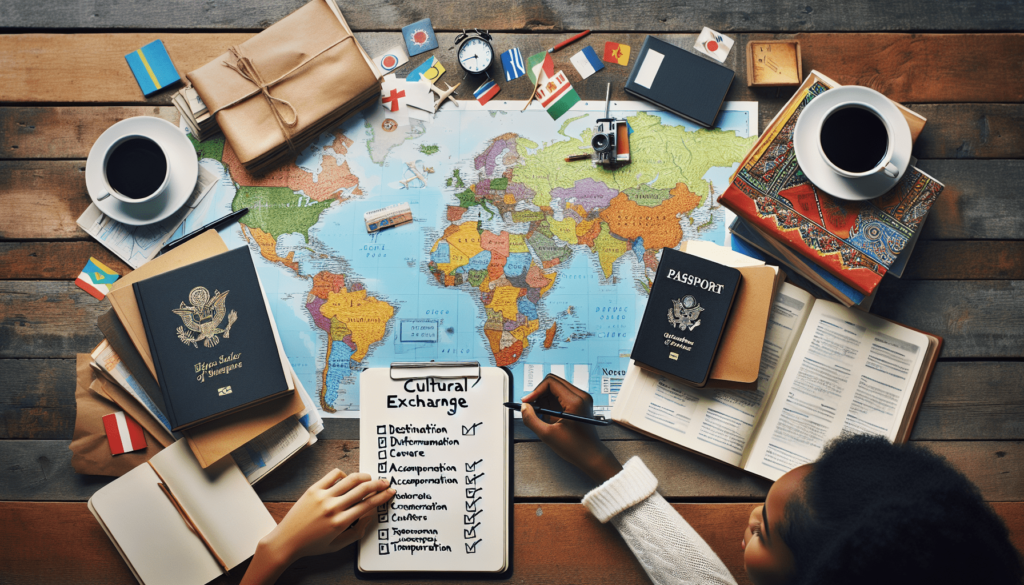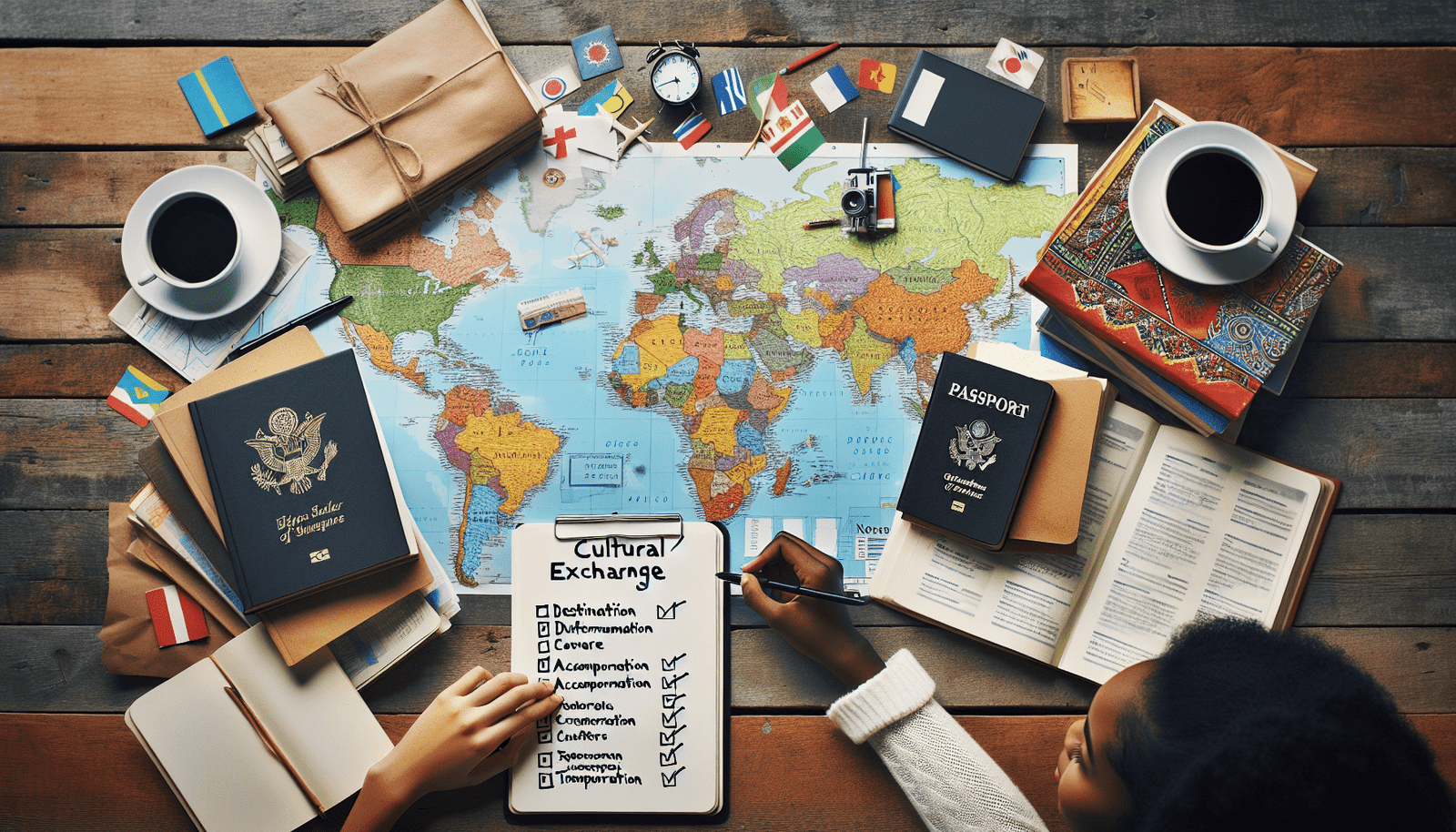Whether you’re a student looking to broaden your horizons or a professional seeking to immerse yourself in a different culture, planning a cultural exchange trip can be an exciting and enriching experience. In this article, you will discover the essential steps to take in order to plan a successful cultural exchange trip. From researching destinations and finding exchange programs, to preparing your travel documents and immersing yourself in the local customs, this guide will provide you with all the information you need to make the most of your cultural exchange experience. So, get ready to embark on a journey of discovery and connection with people from around the world!

Choosing the Destination
When planning a cultural exchange trip, the first step is to carefully choose the destination. Take some time to research different destinations and consider the cultural significance of each one. Think about what interests you the most and what you hope to gain from the experience. Consider the cultural sites, historical landmarks, and any specific traditions or customs you might want to learn about.
Another crucial factor to consider when choosing a destination is safety and security. Ensure that the country you choose has a stable political and social environment. Make sure to check travel advisories for any potential risks or safety concerns. It’s always best to prioritize your well-being when choosing the destination for your cultural exchange trip.
Setting the Duration
Once you have decided on a destination, the next step is to determine the length of your trip. Consider how much time you have available and how long you would like to immerse yourself in the local culture. Take into account any time constraints you may have, such as work or personal commitments.
While it’s important to have a clear plan for your trip, it’s also advisable to allow for some flexibility in your schedule. This will give you the opportunity to make spontaneous decisions and take advantage of unexpected cultural experiences that might arise during your trip.
Finding Accommodation
Finding suitable accommodation is another essential aspect of planning a cultural exchange trip. Research different accommodation options such as hotels, hostels, guesthouses, or even homestays. Consider your budget constraints and choose accommodation that aligns with your financial plan.
Additionally, selecting a location close to cultural sites and attractions can greatly enhance your experience. Stay somewhere conveniently located to make it easier to access the places you want to visit and immerse yourself in the local culture.

Arranging Transportation
Researching transportation options is crucial to ensure smooth travel during your cultural exchange trip. Consider the various transportation systems available in your chosen destination, such as buses, trains, or taxis. Look into their reliability, affordability, and efficiency.
If you are traveling from a different country, booking flights or train tickets in advance can save you both time and money. Compare prices and schedules to find the best options for your trip. Remember to consider any local transportation passes or cards that might offer discounts or convenient access to public transportation.
Planning Cultural Activities
To fully immerse yourself in a different culture, it’s important to plan cultural activities that align with your interests. Take the time to learn about the local customs and traditions. Research cultural events and festivals that might be taking place during your visit. Consider reaching out to local cultural organizations to inquire about the events or activities they offer to tourists.
By planning ahead, you can make the most out of your cultural exchange trip and gain a deeper understanding of the local culture.
Language Preparation
Preparing yourself by learning a few key phrases and vocabulary in the local language can greatly enhance your cultural exchange experience. It shows respect for the culture and helps you connect with locals on a deeper level. Look for language learning resources online, such as apps, websites, or language exchange platforms.
Consider finding language exchange partners who can help you practice the language conversationally. They can offer insights into the local culture and potentially become friends during your trip. Enrolling in language classes, either online or in person, can also provide a structured learning environment if you prefer a more formal approach to language acquisition.
Budgeting and Financial Planning
Financial planning is a crucial part of any trip, including cultural exchange trips. Create a trip budget by estimating the expenses for accommodation, transportation, meals, and any cultural activities you plan to engage in. Research the cost of living in your destination to have a clear idea of what to expect in terms of daily expenses.
Make sure to consider currency exchange rates and plan accordingly. It’s advisable to have some local currency with you for initial expenses, but also use credit cards or contactless payment methods for convenience and safety.
Obtaining Necessary Documents
Before embarking on your cultural exchange trip, ensure that your passport is valid for the duration of your stay. Check the entry requirements for your chosen destination, including visa requirements. Apply for any necessary visas well in advance to avoid any last-minute complications.
Travel insurance is also essential to protect yourself from any unforeseen circumstances. Ensure that your insurance coverage is valid in your destination country and provides adequate protection for medical emergencies, trip cancellations, or loss of belongings.
Connect with Local Communities
To truly immerse yourself in the local culture, connect with local communities during your cultural exchange trip. Research and contact local cultural exchange programs that facilitate meaningful interactions between locals and visitors. These programs often offer language exchange opportunities, cultural activities, or even homestay options to help you establish connections and gain a deeper understanding of the local culture.
Social media platforms can also be a valuable resource for connecting with local communities. Search for local social media groups or forums where you can ask questions, seek recommendations, and potentially meet up with locals during your trip. Additionally, consider reaching out to local residents or host families who might be willing to show you around, share meals, or offer valuable insights into the local culture.
Packing Essentials
When packing for your cultural exchange trip, it’s important to make a thorough list of essentials. Consider the climate and weather conditions of your destination and pack appropriate clothing. Do some research to understand what is considered culturally appropriate in terms of attire to ensure that you respect local customs and traditions.
In addition to clothing, don’t forget to pack any necessary medications, toiletries, and electronics. Depending on your interests, you might also consider bringing a camera to capture the unique cultural experiences and beautiful moments during your trip.
By following this comprehensive guide, you can ensure a well-planned and fulfilling cultural exchange trip that allows you to immerse yourself in a new culture, gain a deeper understanding of local traditions, and forge meaningful connections with locals. Happy travels!

